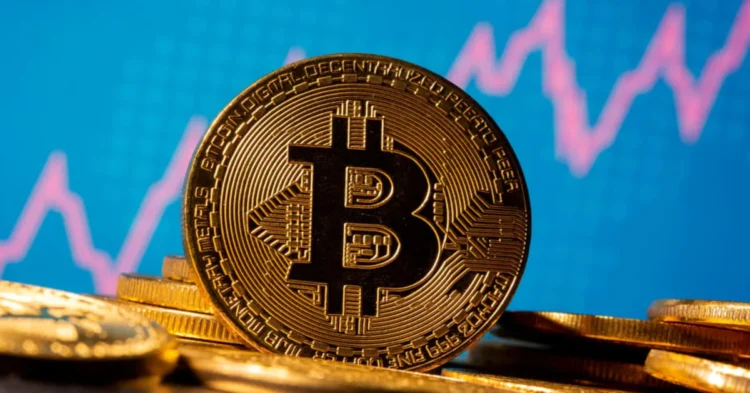In a world marked by economic uncertainties and geopolitical tensions, the role of cryptocurrencies, particularly Bitcoin, has been a topic of extensive debate. As the digital currency continues to gain prominence, questions arise about whether it serves as a hedge against economic crises or a beacon of financial inclusion in unbanked regions.
This article explores the multifaceted role of Bitcoin in crisis management, delving into its potential as a store of value, a hedge against inflation, its relevance in geopolitical tensions, and its impact on financial inclusion. Additionally, we’ll examine the associated risks and volatility while offering insights into its future outlook.
Bitcoin as a Store of Value

The Evolution of Bitcoin’s Perception as Digital Gold
Bitcoin has come a long way from its inception as a digital experiment to its current status as a potential store of value. Initially dismissed by many as a speculative bubble, it has gradually evolved into a digital equivalent of gold. Investors, particularly during times of crisis, have sought refuge in Bitcoin, perceiving it as a secure store of wealth.
Historical Price Performance During Financial Crises
One of the key indicators of Bitcoin’s potential as a store of value is its historical price performance during financial crises. For instance, during the global financial crisis of 2008, Bitcoin was relatively unknown but demonstrated resilience. Since then, it has experienced exponential growth during various economic downturns, sparking debates about its potential to replace traditional safe-haven assets.
Correlation Analysis with Traditional Assets During Crises
Examining Bitcoin’s correlation with traditional assets, such as stocks and bonds, during crises is crucial. A low or negative correlation suggests that Bitcoin could serve as a valuable diversification tool within a portfolio, potentially reducing overall risk. Understanding this correlation is essential for investors seeking to navigate turbulent economic times.
Bitcoin as a Hedge Against Inflation
Inflation and Its Impact on Traditional Assets
Inflation erodes the purchasing power of fiat currencies and diminishes the returns on traditional investments like savings accounts and bonds. Investors have turned to Bitcoin as a hedge against inflation due to its scarcity and deflationary nature. But does it truly serve as an effective hedge?
Bitcoin’s Limited Supply and Its Relation to Inflation
Bitcoin’s supply is capped at 21 million coins, making it immune to inflationary pressures that affect fiat currencies. This scarcity has led some to view it as “digital gold,” a commodity that holds its value as traditional currencies depreciate. We’ll explore the dynamics of Bitcoin’s supply and its role in preserving wealth during inflationary periods.
Case Studies of Bitcoin’s Performance During Inflationary Periods
Analyzing real-world scenarios, such as hyperinflation in Venezuela or economic turmoil in Zimbabwe, can shed light on Bitcoin’s effectiveness as an inflation hedge. We’ll examine these case studies to determine if Bitcoin indeed offers a viable solution for protecting wealth in inflation-prone regions.
Geopolitical Tensions and Bitcoin

How Geopolitical Events Affect Financial Markets
Geopolitical events, such as trade wars, sanctions, and political instability, can have a profound impact on financial markets. Investors often seek safe-haven assets during times of geopolitical uncertainty. Bitcoin’s role in this context is intriguing; it’s borderless and decentralized, potentially providing an avenue for wealth preservation.
Bitcoin as a Means of Preserving Wealth in Unstable Regions
In regions marked by economic instability and currency devaluation, Bitcoin can offer individuals an alternative financial system. We’ll explore examples of citizens using Bitcoin as a lifeline in countries with unstable governments and examine the challenges they face.
Regulatory Challenges and International Adoption
The regulatory landscape for cryptocurrencies is evolving globally. Governments are attempting to strike a balance between fostering innovation and ensuring consumer protection. We’ll discuss the challenges and prospects of international adoption of Bitcoin in the context of geopolitical tensions.
Bitcoin as a Financial Beacon in Unbanked Regions
The Unbanked Population and Financial Exclusion
A significant portion of the global population remains unbanked, lacking access to basic financial services. Bitcoin’s borderless and accessible nature has the potential to bridge this gap, offering financial inclusion to those who need it most.
Bitcoin’s Potential to Provide Financial Services in Underserved Areas
In regions with limited access to traditional banking infrastructure, Bitcoin can serve as a means of transferring funds, saving, and even accessing loans. We’ll explore initiatives and success stories where Bitcoin has empowered unbanked communities.
Success Stories and Challenges of Bitcoin Adoption in Developing Countries
While Bitcoin presents promising solutions, it’s not without challenges. We’ll delve into both the success stories of Bitcoin adoption in developing countries and the obstacles that hinder its widespread use, including technological barriers and regulatory hurdles.
Risks and Volatility

The Inherent Volatility of Bitcoin
Bitcoin’s price volatility is a double-edged sword. While it can offer substantial gains, it can also lead to significant losses. Understanding the factors driving Bitcoin’s price swings is essential for investors looking to navigate its volatility effectively.
Comparing Bitcoin’s Risk Profile to Traditional Assets
Investors should weigh the risks associated with Bitcoin against those of traditional assets. We’ll provide a comparative analysis to help individuals make informed decisions when incorporating Bitcoin into their portfolios.
Risk Management Strategies for Bitcoin Investors
Given the risks, it’s crucial to outline risk management strategies for Bitcoin investors. This section will provide insights into how to mitigate potential losses while harnessing the benefits of Bitcoin as part of an investment strategy.
Future Outlook and Conclusion
The Evolving Role of Bitcoin in Crisis Management
As Bitcoin continues to mature and gain acceptance, its role in crisis management is likely to evolve. We’ll speculate on how Bitcoin might fit into the financial landscape during future crises and its potential impact on global financial systems.
Potential Challenges and Opportunities
No discussion about Bitcoin is complete without considering the challenges it faces. We’ll highlight regulatory uncertainties, scalability issues, and potential threats to its status as a store of value, as well as the opportunities for growth and adoption.
Final Thoughts on Bitcoin’s Place in Crisis Management
In summary, Bitcoin serves a complex role as both a potential safe haven, a hedge against inflation, and a source of financial inclusion in underserved regions. Yet, its utilization is not without challenges, and stakeholders must grapple with the inherent risks and uncertainties tied to its adoption. As the cryptocurrency ecosystem undergoes ongoing transformation, gaining insight into Bitcoin’s dynamic role within crisis management becomes imperative for prudent financial decision-making in our rapidly changing global landscape. Within this context, exploring innovative solutions such as bitsoftware360.com which aims to streamline cryptocurrency trading, becomes particularly pertinent for those seeking to engage with digital assets effectively.
 Hi Boox Popular Magazine 2024
Hi Boox Popular Magazine 2024


